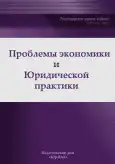Legal Aspects of the Place and Role of Artificial Intelligence Technologies in Achieving the Goals of the Socio-Economic Development of the Russian Federation
- Authors: Korolkova D.A.1
-
Affiliations:
- Military University named after Prince Alexander Nevsky Ministry of Defense of the Russian Federation
- Issue: Vol 18, No 6 (2022)
- Pages: 59-65
- Section: Articles
- URL: https://journals.eco-vector.com/2541-8025/article/view/545903
- ID: 545903
Cite item
Abstract
Purpose of the study. The article analyzes the legal aspects of the role and place of artificial intelligence in achieving the goals of the socio-economic development of the Russian Federation. This is necessary to identify gaps in the legal regulation and use of artificial intelligence technologies, as well as to determine the main directions for improving Russian legislation in this area. The article proposes a definition of the concept of «artificial intelligence technology», which should be understood as a computer program that operates on the basis of a set of data and commands intended for the functioning of a computer, which has the ability to: solve problems that are considered creative; carry out analytical work for the purposes of error correction and flexible adaptation, which allows simulating human cognitive functions (including self-learning and searching for solutions without a predetermined algorithm) and obtaining results when performing specific tasks that are at least comparable to the results of human intellectual activity. Conclusions. In the course of the study, it was possible to come to the conclusion that the developer should be responsible for the actions of the carrier of artificial intelligence, robots and the object of robotics, if harm or damage was caused to AI due to a failure, software errors, and if the cause of causing harm/damage was the wrong exploitation of the user, then the responsibility should be borne by the user (the entity that receives the profit). In addition, the law should provide grounds for exemption from liability for harm or damage caused by AI. The above problematic issues of legal regulation of the use of artificial intelligence technologies require significant changes in Russian legislation.
About the authors
Daria A. Korolkova
Military University named after Prince Alexander Nevsky Ministry of Defense of the Russian Federation
Email: daria.kirilchenko@mail.ru
Cand. Sci. (Law), Associate Professor of the Department of Civil Law Moscow, Russian Federation
References
- Barakina E.Yu. Regulatory platforms in the field of legal regulation of the use of artificial intelligence // Actual problems of Russian law. 2021. V. 16. No. 6 (127). S. 82.
- Gadzhiev G.A., Voinikanis E.A. Can a robot be a subject of law (Search for legal forms to regulate the digital economy)? // Right. Journal of the Higher School of Economics. -2018. -No. 4. -P. 24-48.
- Danilov I.B. Basic approaches to the legal regulation of relations involving robots // Legal Research. -2019. -No. 6. -P. 7-15.
- Dremlyuga R.I., Dremlyuga O.A. Artificial intelligence as a subject of law: arguments for and against // Legal Policy and Legal Life. -2019. -No. 2. -P. 120-125.
- Laptev V.A. The concept of artificial intelligence and legal responsibility for its work // Law. Journal of the Higher School of Economics. 2019. No. 2. P. 79-102.
- Morhat P.M. Responsibility of third parties for the commission of harmful actions by artificial intelligence units // Public Service and Personnel. 2018. No. 3. P. 47-49.
- Morhat P.M. Peculiarities of legal regulation of the use of artificial intelligence units for various purposes // Law and Education. 2018. No. 8. P. 69-77.
- Neznamov A.V. To the question of the place of artificial intelligence technologies and robotics in the system of legal regulation // Agrarian and land law. 2021. No. 12 (204). pp. 216-218.
- Stepanyan A.Zh., Zaplatina T.S. Legal regulation of robots and artificial intelligence in Latin America, the problem of human rights and AI. Lex russica (Russian law). 2020;73(7):127-136.
- Yastrebov O.A. Legal personality of an electronic person: theoretical and methodological approaches // Proceedings of the Institute of State and Law of the Russian Academy of Sciences. 2018. Vol. 13. No. 2. pp. 36-55.
Supplementary files











